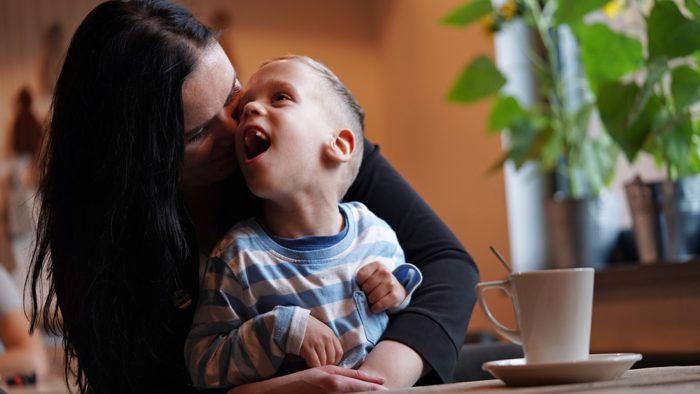FAMILIES with disabled children are at breaking point, left without the support they need, according to new research.
Just weeks after hearing that many of them may lose thousands of pounds in benefits, a new report from national disability charity Sense reveals the huge delays parents face to be seen by children’s social services.
By law, disabled children are entitled to an assessment to identify their needs and ensure they receive the necessary support. This is a crucial step in securing support services such as home adaptations, support with personal care and access to day centres.
Parents, however, say they are waiting more than 200 days for their child to be seen by a social worker – with one in four waiting over a year.
Without a referral and assessment, families are unable to get any support from their local authority. Nearly half of families say without this support they are struggling to cope.
Sense says in 18 local authorities the average length of assessments is more than the 45-day legal limit, with one local authority almost double the legal limit. In Knowsley the average wait is 48 days, while in Sefton it is 46.
Two in five of the parents interviewed from Liverpool said, over the past year, they haven’t been able to get the support they need, and two thirds were exhausted from constantly battling for help.
The charity’s report – ‘From crisis to care – making social care work for disabled children’ – says every step of the process of securing support is a long, drawn-out process for parents.
Multiple assessments and prolonged delays are common, and even when families are granted support, local services are rarely available. Nearly a third of parents say they have been unable to access the support they need from children’s social services, and two in five who have been successful in securing social care support say they had to fight their case at tribunal.
The emotional toll is overwhelming, with nearly two thirds of parents telling the charity they’re terrified further cuts will be made to their child’s care.
The charity’s chief executive, James Watson-O’Neill, said: “Access to high quality support can be life changing – it is the difference between a child feeling lonely and left behind, and a child having the support they need to grow, learn and thrive.
“But the social care system is failing disabled children and leaving families at breaking point. Parents shouldn’t have to fight for the care their children deserve. We need urgent reform to ensure all children get the support they need without facing unacceptable delays.”
Sense’s research also reveals the financial strain on families, with the average disabled household spending £1,599 of their own money in the past six months to support their disabled child’s needs. With one in 20 families spending more than £5,000 in the past six months, many say they are turning to loans, credit cards and even crowdfunding to plug the gaps.
Sense wants to see a new legal duty introduced to assess all disabled children, streamlining the process for families and ensuring all children get the best start in life.
Mr Watson O’Neill added: “Disabled children should not be bearing the brunt of a broken system. We’re calling on the Government to make disabled children a priority, by establishing a clear and consistent pathway to support and a national threshold to assess all disabled children. These must be backed by adequate funding and investment in local services.”
There are 1.8 million disabled children in the UK.
Case study: “I applied to have an assessment four times for my deafblind child before anyone came to see us – and when they did, they said we didn’t need any support”
Carla Alderman is mother to Cameron, 12, who is deafblind. Because of his complex needs, Cameron now has additional support, including intervenors (trained professionals) who visit his home, paid for through direct payments, but to get to this point has been a painful battle for Carla.
“Nothing has been easy when it comes to social care,” Carla says. “Other parents assume that if you have a disabled child, you get a social worker and all of this free support around you, but it didn’t happen like that at all.”
It wasn’t until the fourth application for a social care assessment was made that a social worker came out to see the family. The first three applications were rejected because Cameron was deemed too young.
This meant he missed vital early years support – though the law says a child is entitled to an assessment when it’s needed, not based on age. When the assessment was finally carried out, years after first applying, Carla was told that she was coping well with Cameron’s needs and did not need intervention from children’s social care.
“I wish the social worker had just come in and told me what I was entitled to. I didn’t know that carers could come into the home to help us with personal care, I didn’t know that there’s respite available. I wasn’t offered these things because they could see we were coping and thought I could just continue to do it all myself.”
Social care support was briefly put in for Carla, requested by Sense, when she was ill during a later pregnancy. After a few months, they were discharged and the assessment process started over.
“It’s really stressful and it just consumed all of my spare time,” Carla reflects, “I felt that if I wasn’t pursuing things and chasing people and contacting social care, Cameron would just be forgotten about.”
Eventually, when Cameron was seven years old, he got support at home, from intervenors. A recent arrangement also allows Carla to have a night away from home once a month, when a carer stays over to care for Cameron.


